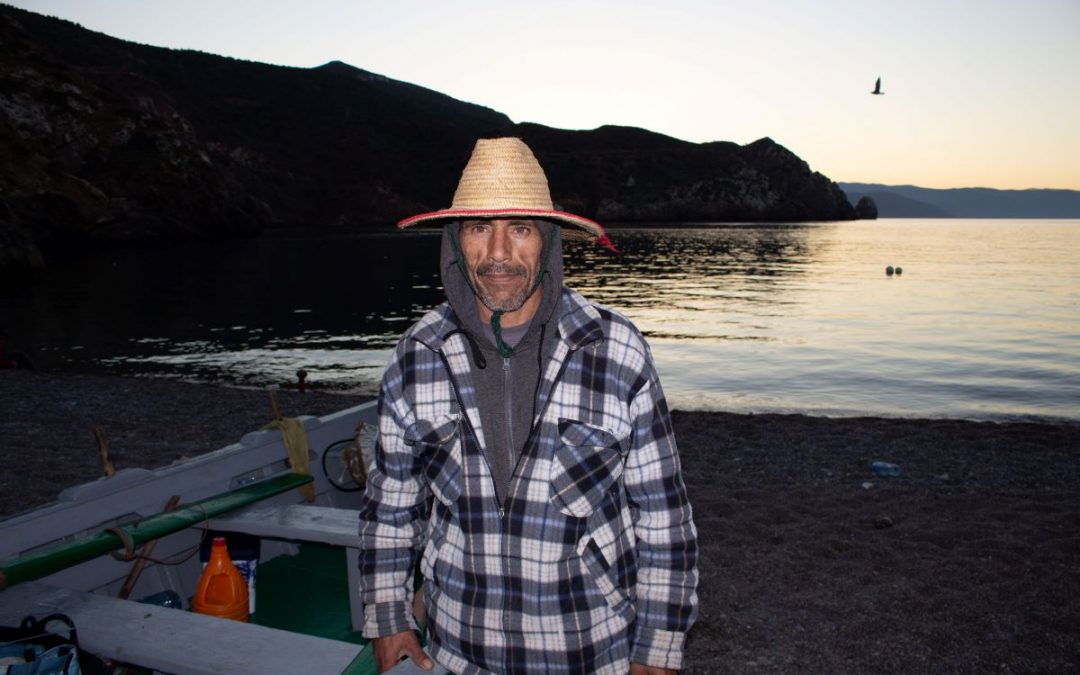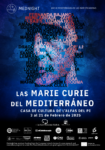Butterflies are unaware of the fuss they make every time they take flight. This little story, set in a tiny place in the southern Mediterranean, begins with a fisherman who demanded water for his village. Thus, he flapped his wings. One waterfall later, in thousands of tiny Mediterranean places there is reason for hope.
The fisherman’s name is Fouade, which means ‘Heart’ in Arabic, and his coastal village is not reached by roads. He belongs to the Bades fishing community: 40 fishermen who feed their families thanks to fishing. Today we call it artisanal fishing, but for them it is just the fishing they know, the one they learned from their parents, who were taught by their grandparents, and the one they now teach their children.
Although very small, Bades is one of the most amazing places in the world. It is a coastal village in the Rif, in the southern Mediterranean, the least developed Mediterranean, the most punished by wars, famines and oblivion.
The Rif in Amazigh language means ‘The Coast’, and extends from Tangier to Saidia, Morocco’s border with Algeria, which is now closed.
If you increase the magnifying glass, Bades is located right in the navel of the Al Hoceima National Park, in the region of the Bocoya tribe, the makers of straw hats that protect the peasants from the sun, 150 kilometres east of the Strait of Gibraltar, with a land and sea area of 485 square kilometres (including 190 square kilometres of sea).
Smallest border in the world
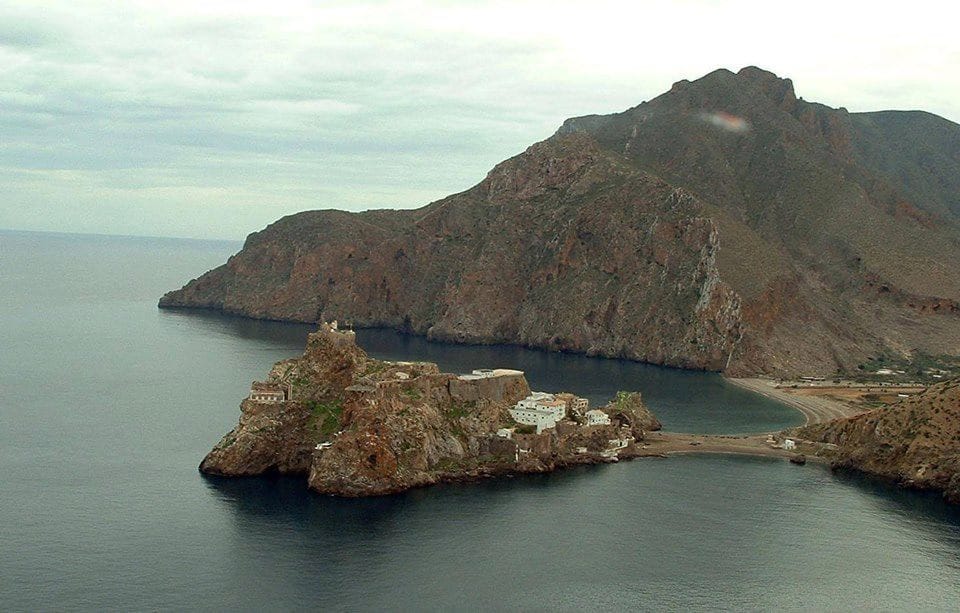
We reach Bades by a road that is often destroyed by floods. On its coast is the rock that the Spanish call Vélez de la Gomera. It was originally an island, but a storm moved enough ground to create a spit of sand that has since linked the islet to the mainland. This islet is one of the remaining sites of Spanish sovereignty, one of the many relics of a colonial past that remains decontextualised in Morocco’s present. The islet is occupied by the Spanish legion. Its badge is painted on the rock and the legionnaires jog along the beach without crossing the border. This, the border between Bades and the rock of Vélez de la Gomera, is the smallest in the world. A simple blue rope, 85 metres long, separates the legionnaires from the fishermen. As we are on the Moroccan side, we are warned that we are not allowed to jump over the rope. Only the seagulls can.
The day Fouade flapped his wings
Fouade and the fishermen of Bades had a problem: water. There was no drinking water in Bades; they had to fetch it from distant wells, sometimes on impassable roads. And the fishermen needed water for their huts by the sea. So one day, Fouade got up with determination, sought out Mohamed Andaloussi and asked him for help.
Mohamed Andaloussi heads the environmental NGO AZIR. Azir stands for ‘lavender’, that sturdy lilac-coloured flowering plant that gives its perfume to the Mediterranean forest. AZIR has been working since 1996 on sustainable development and environmental education in the Rif, developing numerous national and international projects; and its director, Mohamed Andaloussi, is a well-known and respected voice inside and outside Morocco.
“Fouade’s request was a small project, but with an important value: water, which is a right,” says Mohamed.
From AZIR, Mohamed contacted a French NGO specialised in the provision of drinking water, À l’Eau Gemeau Solidarité and obtained 8,000 euros to start working with: “When the NGO came to supervise the work, they discovered that the fishermen’s village, the houses of the families, had no water. They saw that it was more urgent to provide water to the houses in the village, not only to the fishermen, because in the houses there were women, families, and children,” recalls Mohamed.
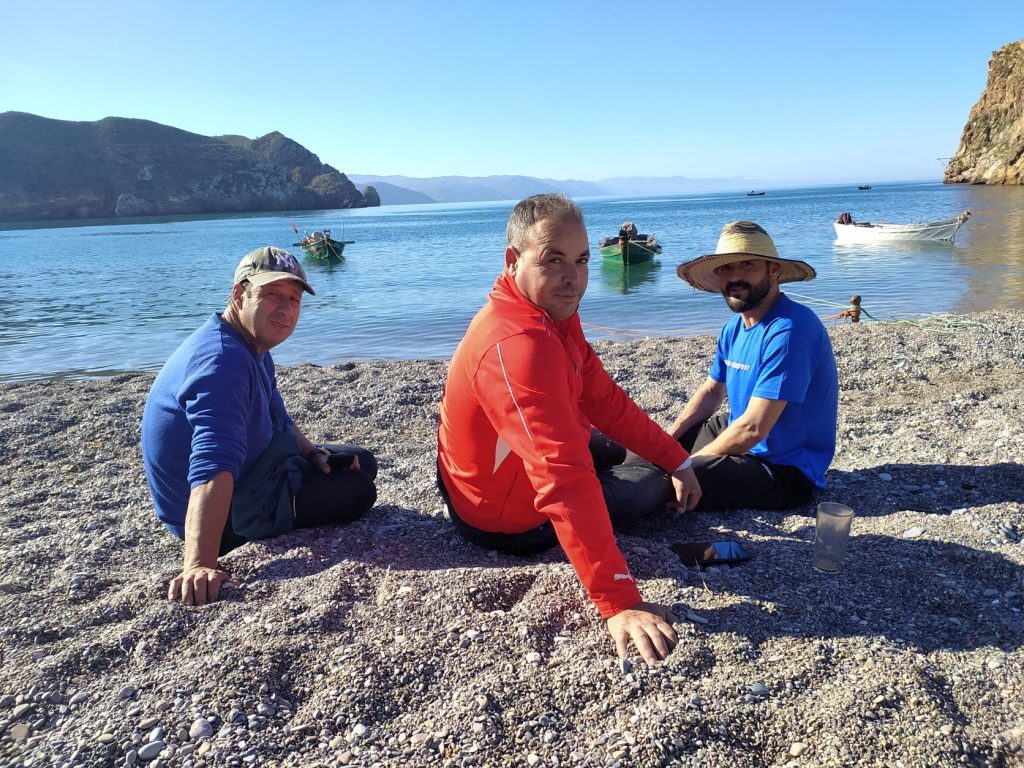
In the centre, wearing a red sweatshirt, Fouade. On the left, Mohamed Andaloussi, and on the right, another of the Bades fishermen.
The well
With the help of the French NGO, the involvement of international volunteers and many of the people of the village, they carried out the first phase: building a community well, installing solar panels to feed the pump that takes the water from the well to a pond, built on a hill, digging trenches and installing the pipe through which the water flows by gravity, from the pond to the village. They took gravel from the beach, the town council put in some cement, and with the little money available they bought the pump, the solar panels and paid for part of the pond.
“The people of the Rif are used to communal work. We did it together,” says Mohamed.
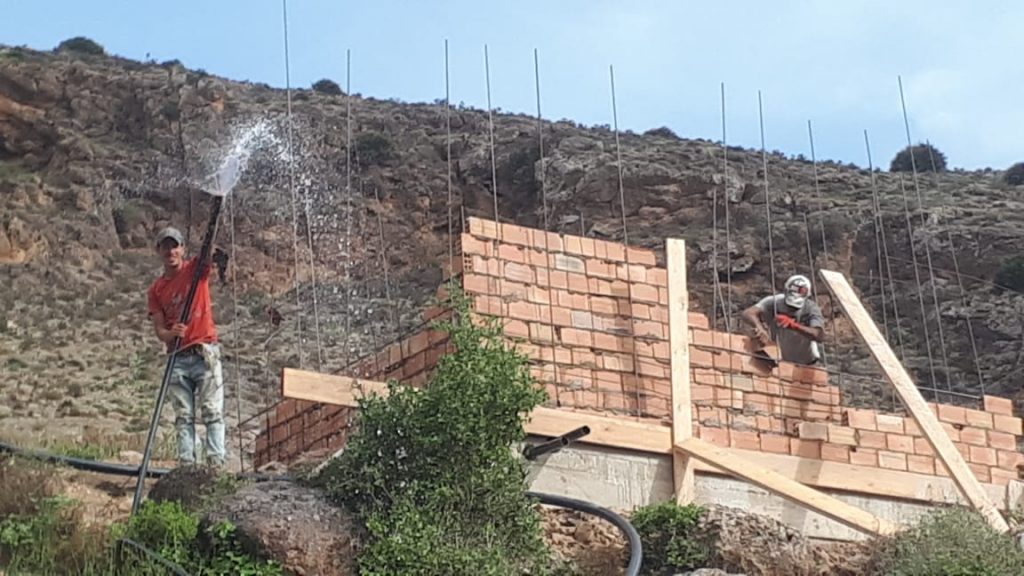
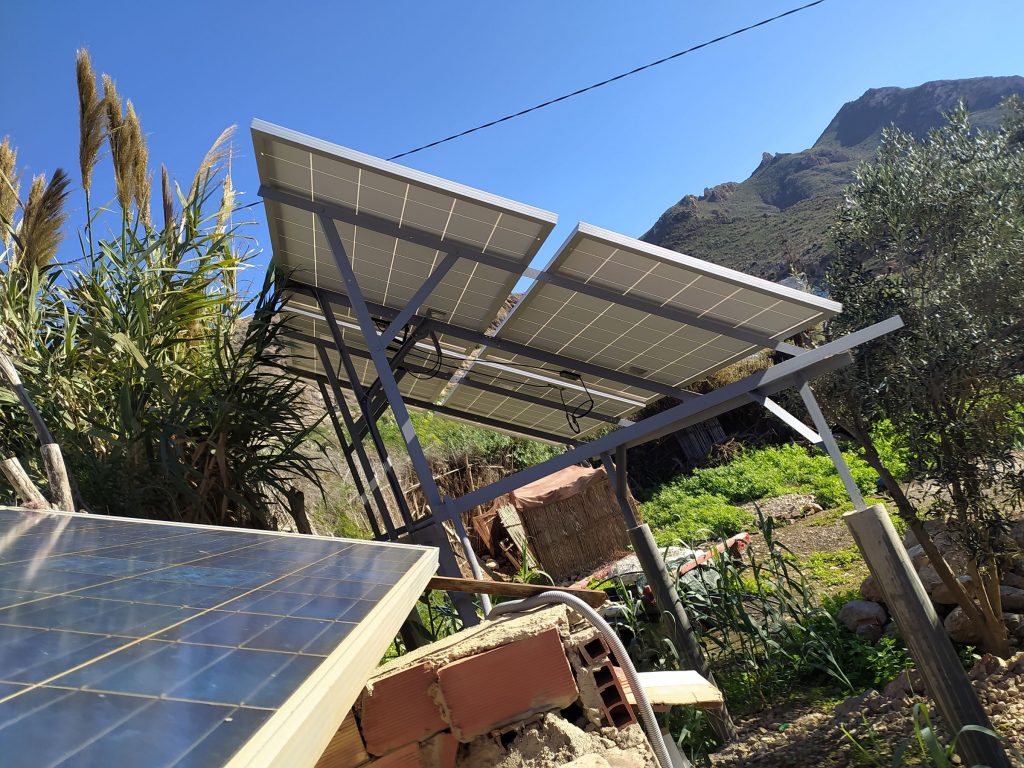
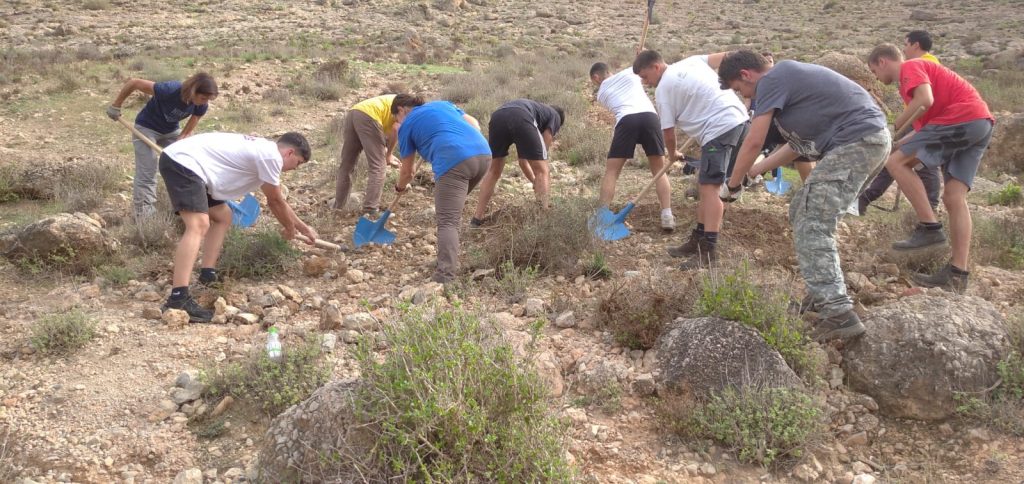
The fishermen return at five
It is December and at 5:00 pm the sun sets in Bades. At that time the fishermen return.
The boats are small, no more than five metres long, with an engine of between 8 and 15 horsepower. It is octopus season. In Bades they fish for octopus with a system they invented here. The boat is carried by the current and they use a triple hook on which they put bait. The drag is in soft, sandy, or muddy areas, the octopus attacks it and gets hooked in the squid jig.
When the octopus season is over, they fish with chambel, a line of hooks with which they catch snapper, bream and sea bream. They are also familiar with the longline: a line several metres long with baited hooks. They set the longline on the bottom during the night and in the morning they remove it and find hooked fish.
It is a very selective fishery. They catch only big fish, the ones that can eat bait; their fishing capacity is small, because their boats are small, so they can’t go long distances; they only fish during the day, they come back at night, and if there is any small swell, they can’t go out to sea. They rest more than they fish. This is exactly sustainable fishing.
“Compare it to intensive fishing, with boats that are fishing 24 hours a day, dragging all kinds of fish, they plunder everything, they don’t enter port, they use freezers…”, explains Mohamed, and he asks a rhetorical question: “Don’t you think it’s worth preserving small-scale fishing?”
Mohamed says he sometimes imagines the destruction of Bades, like so many other coastal villages: “If traditional fishing is not valued, it will disappear, and it is a cultural, archaeological and historical heritage of this area and of the whole Mediterranean.” The small green and white boats of the Bades fishermen have arrived on the coast. Together they pull them up onto the beach and put them in the shelter. This afternoon they bring octopus. There is a van waiting to pick them up and take them to Europe. The Bades fishermen are paid the equivalent of 6 euros per kilo of octopus. In the Madrid market, at Christmas, it was 45 euros per kilo.
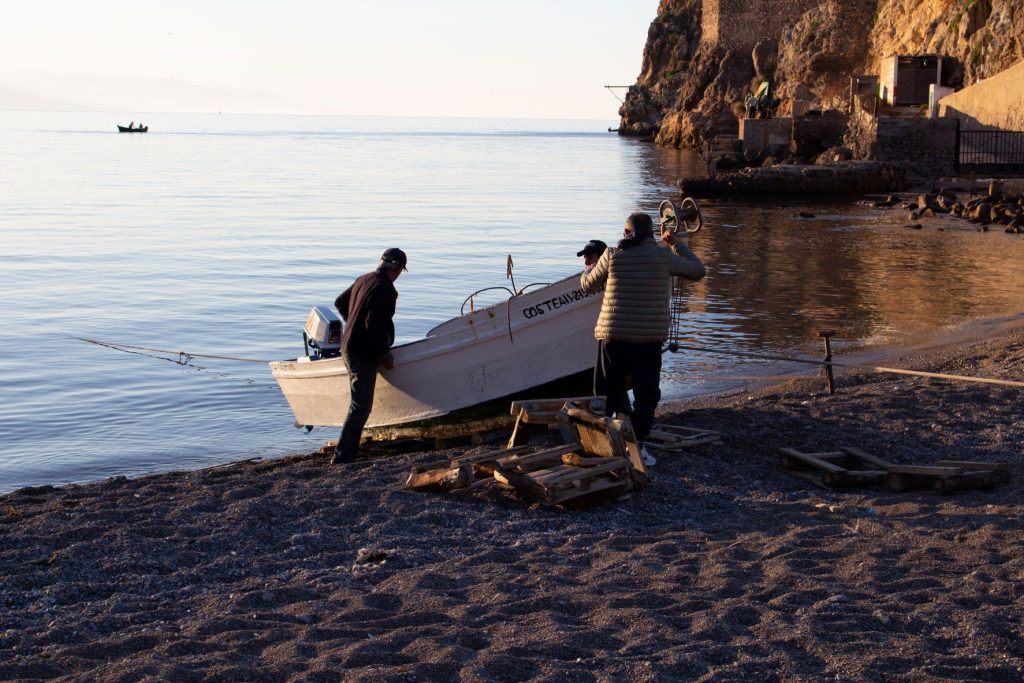
The arrival of the Costeau on the shore at Bades beach..
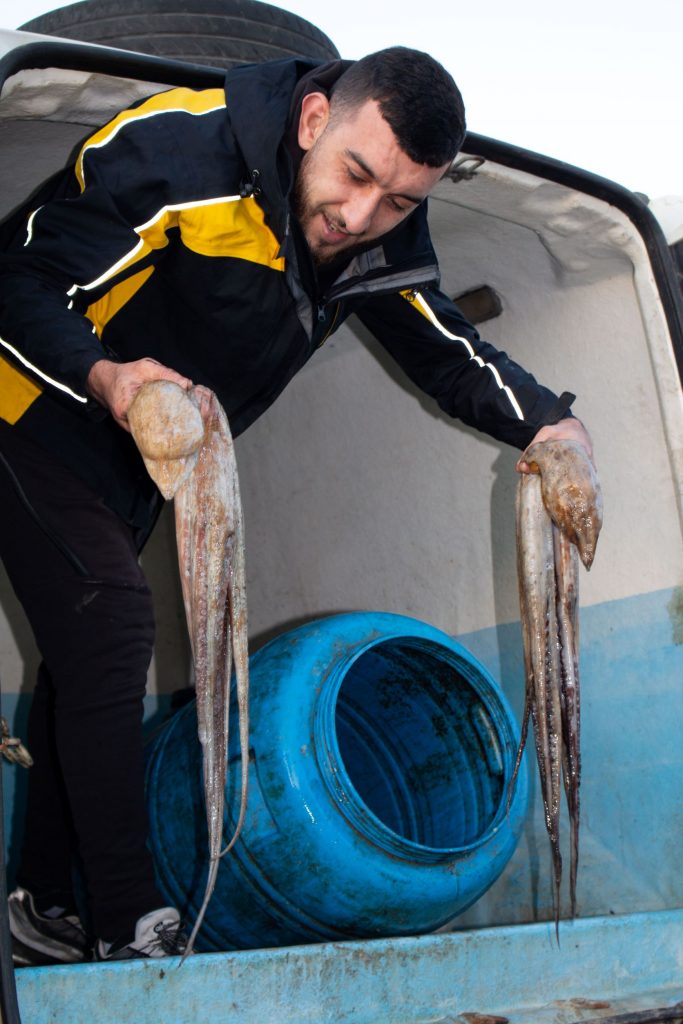
Bades is all the villages
Artisanal fisheries account for more than 84% of the total Mediterranean and Black Sea fishing fleet, employing almost 62% of the labour force. Therefore, Bades stands for all those small towns that still live off the sea collecting fish almost with their hands.
In 2018, the EU signed a 10-year Regional Action Plan to promote sustainable small-scale fisheries in the Mediterranean and Black Sea area. This plan sets out measures to ensure the sustainable use of fish stocks and to support the long-term economic and social prosperity of artisanal fishermen and coastal communities.
The Regional Plan of Action on Small-Scale Fisheries in the Mediterranean and the Black Sea is non-binding, but it is the first international instrument dedicated to small-scale fisheries since the FAO adopted the Voluntary Guidelines for Securing Sustainability Small-Scale Fisheries in the Context of Food Security and Poverty Eradication in 2014.
So in Bades they are not completely alone. From AZIR, Mohamed wants to create a network of artisanal fishermen from the Mediterranean Sea, with people from Motril, Granada, brotherhoods from Malaga, and associations from Cadiz such as SoldeCocos. “We want to make them known, help them to revalue artisanal fishing, give it the importance it deserves and have more economic value than industrial fishing. We want it to have a certification, although this needs a complex legal process,” explains Mohamed..
The ultimate goal: beyond Bades
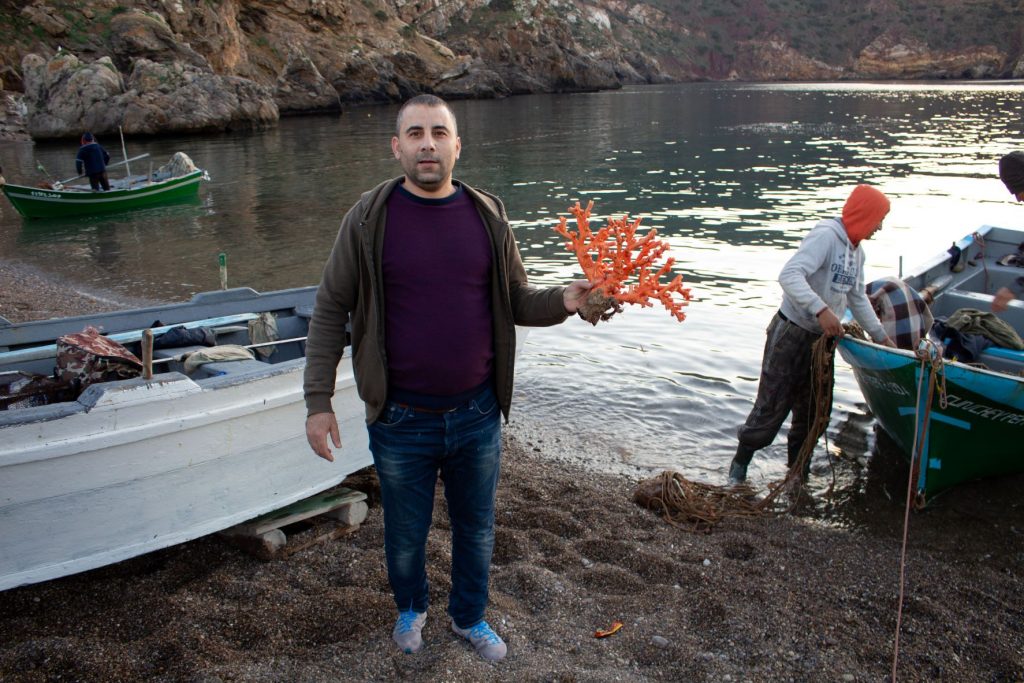
The Alhucemas National Park is a hidden gem, dotted with Rif’s settlements such as Bades, and crossed by dirt roads. Its isolation has helped preserve several endangered species, from its tuya forests to an important osprey colony. The Alhucemas National Park preserves the last vestiges of the original biodiversity of the Mediterranean. And Mohamed’s goal, beyond providing water to a village, is for the sea that borders the coast of the national park to also be protected, fighting for it to become a marine reserve. When this happens, if it does happen, the fishing areas will have to be closed down.
“Our ultimate goal is the reserve, and the work we have done in Bades will serve to gain the confidence of the fishermen. If you are going to enclose the sea, you will have radical opposition from the fishermen, because you are taking away vital fishing space. That’s why we need them to believe in us, and if we do enclose and reserve, we expect them to help us. If they trust us, they will believe us when we tell them that it’s worth it, that we will have to wait a while, but then the sea will bear more fruit. We have experience in Italy, Spain, and other parts of the world. We need a lot of means, surveillance, paying fishermen directly so that they don’t go out to fish at many times, means that we don’t have now. We don’t have money, we don’t have staff, what we do have is the will of the people.”
And so it was that one fine day Fouade woke up with a determination: to ask for water for 40 fishermen in her village. She flapped his wings and the butterfly effect will one day make his village an inspiration of hope.
“For in the dew of little things the heart finds its morning and is refreshed.”
The Prophet (1923), Khalil Gibran
—————-
In May 2008, AZIR received the ”WWF AWARD FOR CONSERVATION MERIT” for its work in defence of the environment in the southern Mediterranean.
The Regional Plan of Action on Small-scale Fisheries in the Mediterranean and the Black Sea involves the General Fisheries Commission for the Mediterranean (GFCM) -under the Food and Agriculture Organisation of the United Nations (FAO)-; 10 EU Member States (Bulgaria, Croatia, Cyprus, France, Greece, Italy, Malta, Romania, Slovenia and Spain); 8 non-EU countries (Albania, Algeria, Georgia, Lebanon, Libya, Montenegro, Morocco and Turkey); Palestine; WWF; and the European Fisheries Control Agency (EFA).

